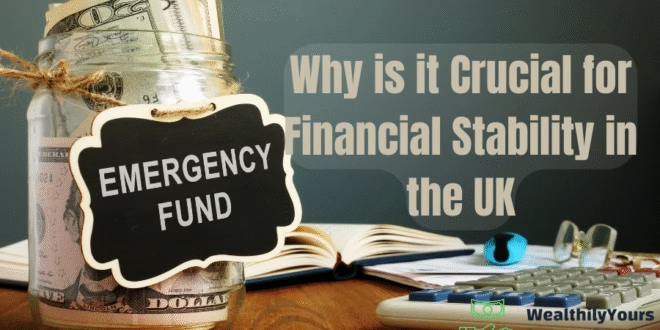Life is unpredictable, and financial emergencies often strike when least expected. That’s why building an emergency fund is one of the smartest financial moves you can make. Whether it’s sudden job loss, medical expenses, or urgent home repairs, an emergency fund acts as a financial safety net, helping you stay afloat without dipping into loans or credit cards.
In this article, we’ll explore the importance and the need to create an emergency fund, how to start, how much to save, and where to store it, especially in the context of UK households and professionals.
Also Read: How to Save Money Fast: Proven Strategies on a Low Income
What Is an Emergency Fund?
This fund is a dedicated amount of money set aside to cover unexpected financial shortfalls. It should be easily accessible and not tied up in long-term investments. For UK residents, it plays a critical role in managing unforeseen costs like NHS delays requiring private treatment, car breakdowns, or redundancy.
Why You Need a Fund for Emergency in the UK
1. Job Security Is Never Guaranteed
In today’s volatile job market, no role is truly secure. Redundancies are common even in large corporations. Having a healthy emergency fund ensures you can manage living expenses like rent, groceries, and utility bills while you search for your next role.
2. Prevents High-Interest Debt
Without a fund for emergency, you might fall back on high-interest credit cards or payday loans. These can spiral into unmanageable debt. A well-funded emergency fund helps avoid such pitfalls by providing instant liquidity when needed.
Also Read: Why Most People Fail at Saving Money – And How to Fix It
3. Covers Unexpected Costs
Unexpected car repairs, boiler breakdowns, or family emergencies can come out of nowhere. An emergency fund cushions the blow, allowing you to handle the situation without disrupting your financial goals.
4. Peace of Mind
Knowing you have a financial cushion brings immense mental peace. You sleep better at night knowing you’re prepared, which has positive effects on your health, relationships, and decision-making.
How Much Should You Save in Your Emergency Fund?
The general recommendation is to have at least 3 to 6 months’ worth of essential living expenses saved. For example, if your monthly expenses are £2,000, aim for £6,000 to £12,000 in your emergency fund. If you’re self-employed or have dependents, you may want to save even more.
Also Read: How to Save Money as a Couple: 8 Proven Ways
Where Should You Keep Your Emergency Fund?
Accessibility is key. The ideal place to store your fund for emergency in the UK is a high-interest savings account or an easy-access cash ISA. These accounts offer some growth on your savings while allowing you to withdraw funds without penalties.
How to Start Building an Emergency Fund
1. Set a Clear Target
Start with a mini goal, perhaps £500 or £1,000, and gradually build up to 3-6 months of expenses. Use budgeting tools or apps to automate savings.
2. Automate Your Savings
Set up a standing order or automate monthly transfers to your fund for emergency account. Treat it like a recurring bill you pay yourself first.
Also Read: Budgeting Strategy 2025: The 50/30/20 Rule Explained
3. Cut Back on Non-Essentials
Review discretionary spending on subscriptions, dining out, or impulse buys. Redirect those funds into your fund for emergency.
4. Use Windfalls Wisely
Bonuses, tax refunds, or side hustle income? Allocate a portion of those to your emergency fund until it reaches your goal.
Mistakes to Avoid When Building an Emergency Fund
- Tying it up in fixed deposits or long-term bonds
- Using it for predictable expenses like car MOT or holidays
- Neglecting to replenish after using it
- Over-saving and missing out on investing for long-term goals
Remember, your emergency fund is for true emergencies only.
Also Read: Best Budgeting Apps UK 2025: Top Budgeting Apps UK for Smarter Spending
Emergency Fund vs. Investing: What Comes First?
While investing is crucial for long-term wealth building, your emergency fund should be a priority. It creates a secure base from which you can confidently invest, knowing that short-term financial hiccups won’t derail your plans.
Emergency Fund for Families vs. Singles
A single person may get by with a smaller emergency fund, but families, especially with children or dependents, should aim higher due to greater variability in expenses.
Why Emergency Funds Are Essential for Financial Independence
If you’re pursuing financial independence, your emergency fund is your first layer of protection. It ensures that you never have to sell long-term assets like shares or ETFs during a downturn, preserving your investment strategy.
Also Read: Living Paycheck to Paycheck UK: How to Break the Cycle and Build Security
FCA Disclaimer
The information provided in this article is for educational purposes only and does not constitute financial advice. Please consult a qualified financial adviser before making any financial decisions. WealthilyYours is not regulated by the Financial Conduct Authority (FCA).
Enjoyed the Post? Share Your Thoughts and Spread the Word!
If you found this blog post informative and helpful, I’d love it if you could share it with your friends, family, or anyone who might benefit from it. Your support helps me reach more readers and continue creating content like this!
Also, I’d love to hear from you! What are your thoughts on the topic? Do you have any questions or insights to add? Drop a comment below - I’m here to chat and learn from your perspective too.
Thank you for being part of this journey, and I can’t wait to hear what you think!
 WealthilyYours Empowering You to Grow, Invest, and Thrive
WealthilyYours Empowering You to Grow, Invest, and Thrive




